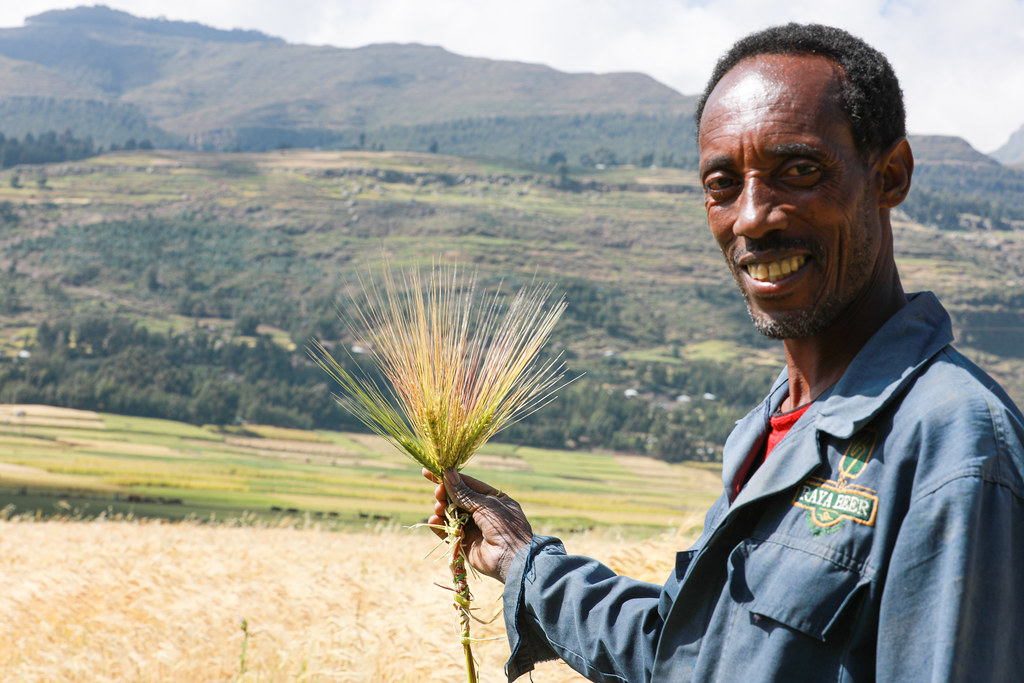Africa RISING Ethiopian Highlands project holds first field day since March
By Million Gebreyes
On 25 October 2020, the Africa RISING Ethiopia Project organized a farmer’s field day event at Ayba Kebele in Tigray Region in northern Ethiopia. The field day, which was held in strict adherence to government prescribed safety measures to stop the spread of COVID-19, was the first such event by the project following the end of five-month state of emergency since April which declared restricting movement and public gatherings in the country.
The field day was held to showcase various improved agricultural technologies by the project. Farmers and select government officials from the regional office of agriculture, zonal agricultural coordination office, district agricultural offices, universities, cooperatives and development agencies attended the event. The participants, particularly farmers and regional government agricultural officers, lauded the Africa RISING team for continuing to implement livelihood enhancing agricultural activities together with the farmers despite the challenges posed by the COVID-19 pandemic.
The collaboration between Raya Beer factory and Africa RISING is encouraging farmers to grow more malt barley to boost their incomes (photo credit: Apollo Habtamu/ILRI).
Solomon Gabreselasie, from the Tigray Region Agricultural Office, noted that the problems faced by farmers in the region have been compounded by the pandemic and the measures put in place to limit its impact. ‘We applaud Africa RISING’s decision to continue working, albeit minimally, with the farmers during the lockdown period,’ he said.
‘Lack of seed is still critical problem in this region and the Africa RISING project has been at the forefront in helping us to secure early generation seeds and engage in seed multiplication,’ said Gabreselasie. His sentiments were echoed by the Tigray Agricultural Research Institute (TARI) Director, Eyasu Berhe who said, ‘we are indebted to the Africa RISING project, it contributes a lot in helping farmers access agricultural technologies and increase their production especially through the cluster seed producer’s mechanism that the project has used with farmers in this region.’
Africa RISING Ethiopia Project Chief Scientist, Kindu Mekonnen, acknowledged the support given to the project team by all government agricultural officers in the region at various levels and committed to continue working with the government and all stakeholders to improve the livelihoods of farmers in Tigray and in the country.
‘Africa RISING is committed to supporting the agricultural sector in Ethiopia by delivering good improved agricultural technologies that will enhance the productivity of farmer’s crops and livestock,’ he said.
Field visit to a desho grass field at Raya University (photo credit: Apollo Habtamu/ILRI).
Some of the technologies and outcomes of the work done by Africa RISING and partners that were highlighted during the event included:
- The partnership between Africa RISING and Raya University: This partnership has enhanced the scaling of faba bean and field pea technologies. Africa RISING has assisted local cooperative unions with early generation seeds while the university is providing much needed pesticides and has allocated land for forage seeds production. This partnership has enhanced local ownership of the work.
- Introduction of improved varieties of faba bean (Gora) and field pea (bilalo). Faba bean and field pea are important crops in Ethiopia but, in Tigray, these crops are affected by faba bean gall disease, which has led to a decline in yield. The early generation seeds (EGS) given to the local cooperative union by Africa RISING have been the only formal seed production system of faba bean and field pea in the region. After observing the performance of these crops in the field, representatives from the regional bureau of agriculture urged the district to certify and collect the seeds for use next year. The regional representatives are now working with the regional inspection unit to certify the EGS field crops (by revising the minimum land area requirement for their cultivation and inspecting the EGS cultivation fields that are up to 1 hectare in size).
- The cluster-based seed production system and the approach of using local cooperative union for the seed production. Two things about these caught the attention of the field day participants, especially higher government officials from the region. First, the field crops were under cluster production. Second, the seed was produced under a formal system with the local union. Both of these were possible through the strong partnership between Africa RISING and Agricultural Transformation Agency (ATA) representative.
This field day event was held before the start of the current conflict in the Tigray Region.






